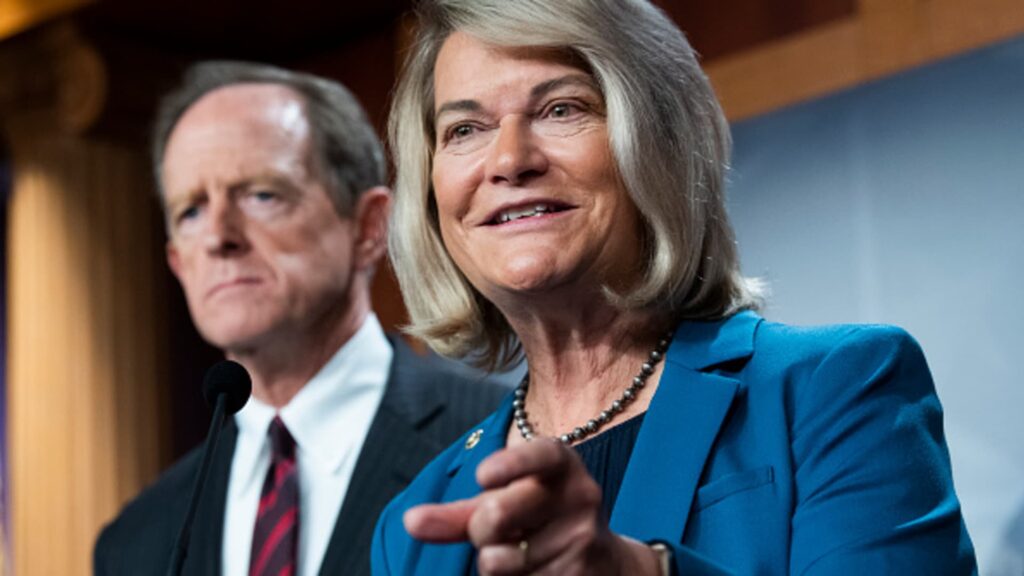Prominent Senator Lummis Takes the Lead The advent of Bitcoin has sparked more interest and speculation than any other breakthrough in the rapidly evolving realm of technology and finance. For years, this cryptocurrency has captivated investors, regulators, and the general public, who have often expressed a mix of amazement and scepticism. Legislators in the United States are now beginning to work together to permit the expansion of Bitcoin, according to Senator Cynthia Lummis, a prominent advocate for digital currencies.
Senator Lummis is a Supporter of the Bitcoin
Wyoming Senator Cynthia Lummis has led the bitcoin movement since assuming office. Lummis’s passion for blockchain and Bitcoin stems from her time as a state treasurer and her financial expertise. She has openly said that Bitcoin is a valid asset class and digital gold. She believes cryptocurrencies are vital to the future of finance and wants to foster their use and growth through legislation.

Her recent pronouncements that this is a “new era” for Bitcoin show lawmakers are open to cryptocurrencies as financial system components. Bitcoin Revolution Renowned, Senator Lummis Leads Lummis emphasises innovation and customer safety. She believes the US can lead the fast-growing cryptocurrency business by rejecting too restrictive regulations.
Crucial Elements of the New Age
Regulatory Clarity
One of Lummis’s key arguments is the necessity for clear and consistent regulatory standards around cryptocurrency. In the wake of years of confusion, regulators are finally establishing guidelines for properly handling digital assets. This transparency is crucial for businesses considering a foray into the bitcoin industry since it removes uncertainty and increases investor trust.
Conventional Financial Systems
Bitcoin and other cryptocurrencies should be integrated into existing banking institutions, according to Lummis. Establishing pathways for the adoption of cryptocurrencies inside pre-existing financial structures will increase the overall stability and resilience of the financial system, according to her. Lummis foresees a future in which conventional banks openly accept Bitcoin and other digital currencies as asset classes, leading to more participation and innovation.
Consumer Protection and Education
As the plan for a new age progresses, Lummis stresses the importance of consumer education and protection. In addition to warning people about the risks of investing in cryptocurrencies, she wants measures taken to prevent fraud. Education is key because it will teach potential investors how to navigate the complexities of digital assets.
Collaborative Regulation
Legislators and the bitcoin business should collaborate, says Senator Lummis. The two camps can create an environment where cryptocurrencies may thrive by working together to draft regulations that promote innovation while preserving security and compliance. As a result of working together, the tension between established financial institutions and the new bitcoin market may subside.
Current Developments in Cryptocurrency
There has been a shift in the atmosphere about cryptocurrency. There has been a change in the way politicians handle digital assets, with Lummis’s opinions echoing throughout legislative chambers. For example, a number of states are currently considering laws that would specifically encourage the development of cryptocurrencies.

Cryptocurrency exchange-friendly legislation and tax incentives for blockchain firms are part of this package. Bitcoin is also continuing to attract the attention of institutions. These shifts demonstrate the critical need for a robust regulatory framework that can accommodate both existing and future innovations.
Bitcoin and the country’s cryptocurrency industry as a whole might feel the effects of this announcement. Bitcoin Revolution Renowned, This article takes a look at Senator Lummis’s comments, the change’s implications for Bitcoin’s future, and the ways in which various financial players could be affected.
Summary
Senator Cynthia Lummis highlighted the significant shift in public opinion and regulation surrounding cryptocurrencies, stating that Bitcoin is entering a new era in the US. To that end, Lummis is advocating for more transparent laws, closer ties to conventional banking, and a more collaborative atmosphere so that digital assets like Bitcoin can thrive. The potential for innovation, expansion, and economic empowerment bodes well for Bitcoin’s future and its place in the broader financial ecosystem. Stakeholders must stay informed and actively participate in conversations that will shape the future of digital assets as they prepare for this change.



